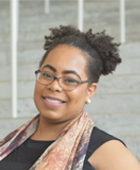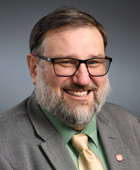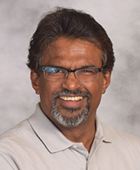The honorees — the first from UT Dallas — will conduct healthcare projects in underserved local communities.
Jazzmyn Wilson Targets Food Desert Issues in South Dallas

Jazzmyn Wilson, a Naveen Jindal School of Management MBA and MS in Information Technology and Management student, is one of two JSOM students recently selected to receive a 2017-2018 Dallas-Fort Worth Albert Schweitzer Fellowship.
Wilson and fellow JSOM student Asha Vadlamudi are the first UT Dallas recipients of the fellowships named for Schweitzer (1875-1965), a physician and Nobel Peace Prize recipient whose medical work embodied an ethical commitment to underserved communities.
Funded entirely by charitable donations and grants, the DFW Schweitzer Fellowship Program this year awarded fellowships to 12 graduate and medical students. The purpose of the program, which is based at SMU’s Dedman College of Humanities and Science, is to develop young leaders who are inspired to make positive changes in health and human services. Each fellow receives a $2,500 stipend to help underwrite costs associated with creating and executing a healthcare project in an underserved community.
Wilson’s project addresses a health and wellness need in South Dallas. Specifically, she says, “I want to address the food desert of South Dallas and help rebuild the connection between the young residents of South Dallas and city institutions, such as Frazier Revitalization and the Diabetes Health and Wellness Initiative [part of Baylor Scott & White’s Southern Sector Health Initiative]. … I want to improve access to healthy food and at the same time foster healthy habits.”
She hopes, she says, her fellowship project will broaden students’ relationship with nutrition awareness.
“With the rise in diabetes, obesity and hypertension, it seems like these residents have been neglected by the city,” Wilson says. Collaborating with the Dallas Farmers Market and area food pantries is also part of her plan.
Growing up in Pleasant Grove in southeast Dallas County, Wilson says, “I can’t imagine what it’s like to not have a grocery store and access to fresh produce.”
As part of her program, she plans to take eighth- through 12th-grade students to an urban farm created at Paul Quinn College to help address local food-desert issues.
Wilson became aware of the fellowship through weekly MBA emails and an announcement in November 2016. Requirements included having a grade-point average of 3.0 or above and submitting a project proposal about specific needs the applicant wanted to address along with three recommendations.
One of these came from Dr. Bill Hefley, a Jindal School clinical professor.
A student in Hefley’s MBA class during his first semester at JSOM, “Jazzmyn asked questions,” he says. “She wanted to understand — not just be able to pass the test, but also have an understanding and be able to apply it. She also demonstrated heart — a caring about others that came through in her ideas for the Schweitzer Fellowship.”

Hefley believes Wilson is tackling a much-needed transformation for South Dallas. “Jazzmyn’s proposed project is focused on reaching young people … and making them more aware of their choices and how they should be eating. There’s such a link between poverty, hunger and lack of educational achievement. Jazzmyn is taking a bold step to try and break this pattern by reaching youth in South Dallas.”
Wilson, who graduated from UT Dallas in 2013 with an interdisciplinary BA degree in management and healthcare, works full time at UT Dallas in addition to being a double grad-degree seeker. She is a systems administration specialist in the Financial Management Services department of the Office of Budget and Finance.
“It’s definitely a balancing act,” Wilson says of her work and school responsibilities. “But I have a strong support system of family, especially my dad, siblings and partner, who have shepherded me through my entire academic and social career.”
Asha Vadlamudi Addresses Healthcare Management Among Older North Dallas Adults

Jindal School student Asha Vadlamudi recently joined fellow JSOM student Jazzmyn Wilson in being selected for a distinctive honor that marks a first for UT Dallas. Vadlamudi and Wilson were chosen as members of the 2017-2018 class of Dallas-Fort Worth Albert Schweitzer Fellows, a select group of graduate and medical students who will create healthcare-oriented community service projects.
The fellowship program is named for the legendary physician and Nobel Peace Prize recipient Albert Schweitzer (1875-1965), famed for committed medical service to people in need. The DFW chapter of the Schweitzer Fellowship Program usually awards nine to 12 fellowships annually. The award carries a $2,500 stipend recipients use to design and carry out a project addressing an unmet health need in an underserved community.
A double-degree seeker enrolled in the Jindal School’s MBA and MS in Healthcare Leadership and Management programs, Vadlamudi earned an undergraduate degree in human development and family science from The University of Texas at Austin.
“After graduating,” she says, “I had been looking for a way to give back to my community in a way that combined my knowledge with my passion for healthcare.”
She opened her UT Dallas email one day and saw a posting for the Schweitzer Fellowship. “I had not previously been familiar with the fellowship,” she says, “but after reading about it, I realized this was exactly what I had been looking for. It was almost as if the opportunity was put right in front of me!”
Vadlamudi’s proposed project for the fellowship will address chronic diseases in North Dallas by implementing a disease-management and prevention program for older adults at the Wellness Center for Older Adults. She says she is planning to conduct free weekly health clinics at a local clinic, which will provide wellness health screenings and key indicator measurements (such as blood pressure and weight).
In addition, “the program will educate participants about healthy living habits and medication management, which will help to keep their diseases at a manageable level. The participants also will take part in free exercise classes and nutrition workshop in which they will be motivated to stay active,” she says.
Due to the rise of chronic disease in older adults, Vadlamudi has designed her program to make participants be more proactive in their own healthcare and disease management.

Dr. Lakshman Tamil, a UT Dallas professor of electrical engineering at UTD, has worked with Vadlamudi for about a year. One of his specialties is developing technologies for chronic-care management, including heart failure. The combination of her biology background and his chronic-care expertise has given Vadlamudi a solid base for her Schweitzer program.
“She has learned a lot about technologies for heart-failure management,” Tamil says. “This knowledge will help her with her Schweitzer fellowship in addressing heart-failure disease in North Dallas.”
Besides going to school, Vadlamudi has a full-time job. She works for Spectocor, a McKinney, Texas-based heart-device monitoring company. “I am a business analyst and work in product development,” she says. “The current project I am involved with is cardiac software and hardware for patient, physician and cardiac technician use.”
Vadlamudi, 24, says she tries to balance work and school by prioritizing so she does not get overwhelmed. “If I know I have a big deadline at work the next day, then I will not stress over schoolwork until after the work deadline has passed, and vice versa. Of course this does not always work when everything comes at once — as it always seems to do! In these cases, I make sure to put forth all of my effort and dedication into work, school and my other commitments, then I make sure to allow myself ‘me time’ afterwards. It gives me something to look forward to and helps me push through the hectic days and weeks.”
She says her family has been her support system from the start, especially her mom, dad and older brother, who moved back to the Dallas-Fort Worth area after earning an engineering degree from UT Austin.
Vadlamudi’s work ethic and enthusiasm should serve her well during her fellowship year. And, Tamil says, “the fellowship will help Asha grow as a leader in the field.”
